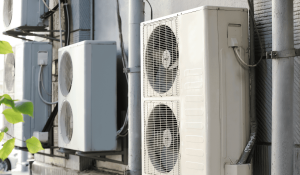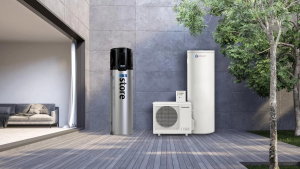Whether you’re looking for a new hot water system or aiming to upgrade to a more energy-efficient option, a heat pump hot water system might be the perfect solution. But what exactly is a heat pump hot water system, and how does it work? This guide will cover all the essential information, including the advantages and disadvantages of heat pump hot water systems, helping you determine if this could be the right system for your home.
What is a Heat Pump Hot Water System?
A heat pump hot water system uses renewable energy to heat your water without the need for solar panels. It absorbs heat from the surrounding air and uses it to heat your water, making these systems highly energy-efficient. They are often referred to as ‘air-source heat pumps’ and can significantly reduce greenhouse gas emissions compared to conventional water heaters.

How Does a Heat Pump Hot Water System Work?
Heat pump hot water systems operate similarly to a refrigerator but in reverse.
Here’s a step-by-step breakdown of how they work:

- Heat Absorption: A fan pulls in outside air into the evaporator, which contains a special refrigerant.
- Refrigerant Transformation: The warm air turns the refrigerant from a liquid to a gas.
- Compression: A compressor pumps the refrigerant gas through a valve, compressing it and generating heat.
- Heat Exchange: A heat exchanger transfers the heat from the gas pipes to a water storage tank, heating the water.
Integrated vs. Split Heat Pump Hot Water Systems
Integrated Systems
An integrated heat pump hot water system combines the compressor and water tank into a single unit. Typically, the compressor is positioned above the water tank. One key advantage of integrated systems is that they require less space and a smaller ground footprint compared to split systems. Additionally, they are quicker and cheaper to install due to the combined unit design.
Split Systems
In contrast, a split heat pump hot water system separates the compressor and the water tank into distinct units. The compressor can be wall-mounted or ground-mounted next to the water tank. Since split systems do not need to be designed to fit atop a cylindrical water tank, they can often be larger and more efficient, reaching higher temperatures. This setup allows for more flexibility in installation, such as placing the compressor outside and the water tank inside. Split systems generally require less clearance from walls for the water tank. However, installation costs for split systems tend to be higher because they involve mounting and connecting two separate pieces of equipment, which might also necessitate a concrete slab for the compressor

Image Source: Scott Dwyer
Benefits of Heat Pump Hot Water Systems
Long-term Cost Savings
Heat pump hot water systems are highly energy-efficient and can save up to 70% on your water heating bills compared to traditional electric water heaters.

Environmental Benefits
By using less energy, heat pump hot water systems produce fewer greenhouse gas emissions, making them an environmentally friendly option.
Effective in Various Climates
While these systems are most effective in moderate to warm climates, they can still operate efficiently in cooler temperatures. However, a booster may be needed in very cold climates.
No Need for Solar Panels
Heat pump systems do not require solar panels, simplifying installation and reducing costs if your home is not suitable for solar panel installation.
Easy Installation
They can be easily integrated with your existing hot water plumbing, making them a convenient option for many homes.
Drawbacks of Heat Pump Hot Water Systems
High Initial Costs
The upfront cost of purchasing and installing a heat pump hot water system can be higher than traditional systems. However, the long-term savings on energy bills can offset this initial investment.
Noise Levels
Heat pumps can generate noise when operating, similar to air conditioning units. This is an important consideration if the unit is to be installed near living spaces.
Performance in Extremely Cold Climates
In very cold climates, the efficiency of heat pump systems can decrease. In such cases, a booster may be needed, increasing both operational cost and energy consumption.
Comparing Heat Pump Hot Water Systems to Alternatives

Electric Hot Water Systems
Electric systems use heating elements to warm water. They are typically less expensive initially but are less energy-efficient and more costly to run over time.

Gas Hot Water Systems
Gas systems use burners to heat the water. They emit fewer greenhouse gases than electric systems and can be more cost-effective but do not match the energy efficiency of heat pumps.

Solar Hot Water Systems
Solar systems use solar panels to heat water. They are very environmentally friendly but require adequate sunlight and roof space. They can be complemented with heat pumps for even greater efficiency.
Rebates and Cost Considerations
Rebates for Heat Pump Hot Water Systems: In states like Victoria and New South Wales, there are rebates available that can help reduce the cost of installing a heat pump hot water system. For instance, Victoria offers a rebate of $1000 for eligible customers under the Solar Victoria program.
Key eligibility criteria for this rebate include:
- Household income of less than $210,000 per year
- Property value under $3 million
- Property address has not received a hot water rebate or a solar battery rebate previously
- The hot water system to be replaced is at least 3 years old
We will assist you with the rebate application and confirm your eligibility as part of the quoting process.
Cost of Heat Pump Hot Water Systems: The cost of installing a heat pump hot water system can range from $4000 to $6000 before rebates. Installation costs can vary depending on whether you are upgrading from an electric or gas system and the complexity of the installation.
Beware of Cheap Offers or ‘Free Upgrades’
As the demand for heat pump hot water systems increases, some companies offer exceptionally low prices or ‘free upgrades’ to attract customers. While these offers may seem attractive, they often come with significant drawbacks:
Quality of Products
Cheaper heat pumps may be less efficient and have higher operational costs over time. These systems might also produce more noise and have shorter lifespans, leading to higher maintenance and replacement costs.
Warranty and Support
Cheaper systems typically come with shorter warranty periods and may have more restrictive conditions. Customers often face difficulties getting support or resolving issues with these systems.
Installation Quality
Companies offering very low prices may cut corners on installation, using less experienced labour. This can lead to improper installation and reliability issues down the line.
It is crucial to research thoroughly, check company reviews, and ensure you are getting a high-quality product and installation. At Plum, we are transparent with our costs and ensure top-quality service without hidden fees.
Is a Heat Pump Hot Water System Right for You?
When considering a heat pump hot water system, it’s essential to evaluate your local climate, installation environment, and long-term energy savings goals. If you live in a moderate to warm climate with sufficient air space for the unit, a heat pump system can be an excellent choice. However, in colder climates, it’s crucial to weigh the potential need for a booster and the associated costs.
Heat pump hot water systems offer a sustainable and energy-efficient alternative to traditional water heaters. With the potential for long-term cost savings and a reduced environmental impact, they are an attractive option for many homeowners. By understanding how these systems work and their benefits and drawbacks, you can make an informed decision about whether a heat pump hot water system is the right choice for your home.
Ready to upgrade to an energy-efficient heat pump water heater? Contact us today to learn more about how you can save on energy bills, reduce your carbon footprint, and enjoy reliable hot water year-round. Don’t miss out on available rebates and incentives—get in touch with us now for a free consultation!










